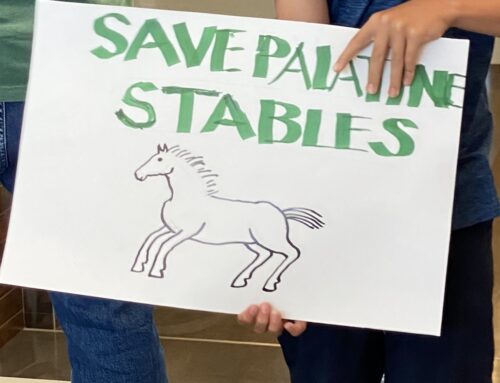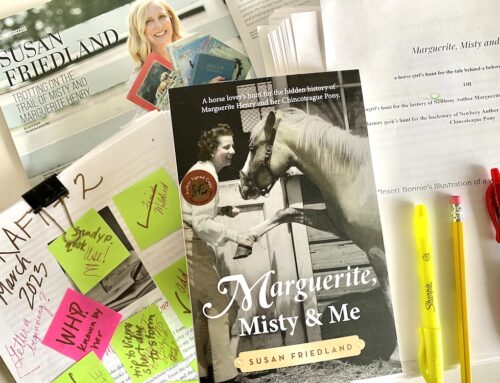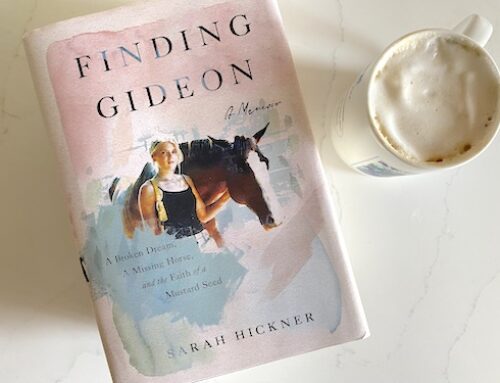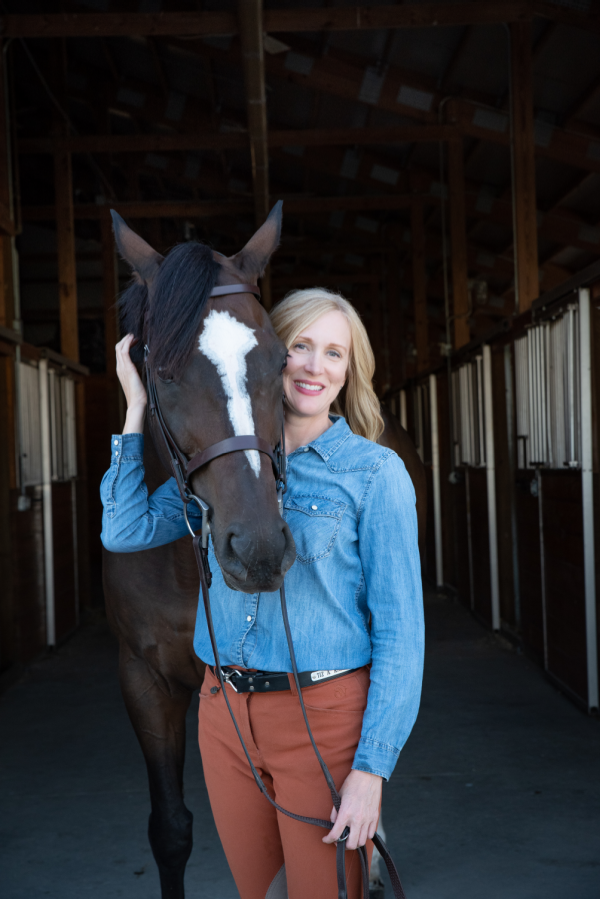I find it funny that my non-horse friends think I know about horse racing, just because I’ve had horses and I ride. I am not sure I could clearly articulate what a trifecta is and I know very little about what kind of training goes into making a truly great race horse that could win the Kentucky Derby. But I have been known to dispense this kind of “advice”:
“If a horse doesn’t want to load into the starting gate that is a good sign. Once it opens he’ll probably blast out of there and have a good lead,” I told my friend Ellie about a year ago when we were spending a beautiful Sunday afternoon at Santa Anita in my stomping grounds of Arcadia, California.
“Also, I’ve heard that you don’t want to pick a horse that’s all sweaty and worked up before even making it to the starting gate. The theory is that he probably has expended so much energy being tense and dancing around prior to the race that he will start out a little tired.”
I don’t even know where I heard those race tips and I certainly can’t verify if they’re true or old wives’ tales. That day I think I placed a total of two or three $2 bets and won about $40. I am content to stop there. And when I have gone to pick up my crazy winnings, it’s always with mixed feelings. I don’t want to advocate a gambling lifestyle and be part of a system that is based on a gambling lifestyle.
For me it’s not an issue or addiction, but I have heard stories of people who have gotten sucked into playing the ponies to their detriment. And it’s cost them dearly. In the form of both relational and personal asset destruction. That’s not the only thing that nags at me as I biennially go to the track or watch a race on TV. There are a few other things I don’t know what to make of.
In 2008 I was watching the Kentucky Derby home alone in my apartment. My roommate was gone and I remember the gorgeous gray filly Eight Belles cross the finish line second and then fall down. As you know, she had to be put down. I didn’t know her or anyone affiliated with her but it was just heartbreaking. All I could think is literally that she ran her heart out. Surely she galloped part of that race in pain until she couldn’t go anymore. I cried, by myself home alone in the apartment. It seemed so wrong. Not necessarily that she was being asked to run, because that’s what Thoroughbreds are meant to do just as Goldens are meant to retrieve. Wrong that the very thing she was meant to do killed her.
The other thing I can’t get over is the sheer number of Thoroughbreds bred each year. I saw an infographic which I can’t find now, but I believe the number is around 38,000 foals born every year. That’s a lot of horses. Only a small percentage will reach the highest echelon of elite racing like the Derby. Where do all those non-contenders go? Fortunately many of them become riding companions and start up a second career. And I know of one who’s become a painter (Click here to see more on Metro Meteor). And there are scores of ex-racehorse adoption organizations throughout the country that do an excellent job facilitating this. However, I believe the supply of available horses exceeds the demand of the riding population in the States. I don’t even want to go down the path of the horse slaughter issue in this post. Too depressing.
My question is: do we really need that many horses born per year? Would there be fewer horses in horse rescues today if that number in the 30+thousands were reduced? I went to a pound last fall with my friend to pick out a dog. It was a memorable experience. Not in a happy way. Too many pitbulls and Chihuahuas. Are some horse breeders making too much “product?”
Also, I finally got around to watching the controversial PETA video this week. It was highly disturbing. Even if only 10% of what is in the video is what has actually happened on the track with that particular trainer, it’s enough to show the ugliness of what is going on in the supposed Sport of Kings.
I don’t want to view this trainer as representative of how ALL trainers conduct themselves, treat horses, treat their employees. It would be like thinking all NFL players are dogfighters or all MLB players are on steroids. However, I do wonder if the owner of the Clippers basketball team got banned for life over wrong remarks (racist), why can’t people who are knowingly and intentionally physically hurting multiple animals get some sort of punishment or ban too? Or at least sidelined while an investigation is conducted?
Perhaps the answers to these questions are out there but I just haven’t read enough or talked to enough people. I’m just a teacher who’s a horse lover with limited time and ability to change a system. My horse DC came from Kentucky. He would never have been any kind of race material. But he was my best friend for 16 years. If there weren’t 30+thousand foals born every year maybe he wouldn’t have existed.
These are some of the reasons why I love/hate the Kentucky Derby. It is two minutes of awesome and uncomfortable.
This year especially, I know that I will be pulling for all of the horses and praying they run safely and that their owners and trainers are lavishing the best possible care on them. I also hope that the almighty dollar and fame will take a back seat to the welfare of these noble equines born to run.
For further reading, here are some articles I’ve looked at recently. Please feel free to add links in the comments section below if there are related ones you’ve encountered. What are your views on horse racing?
http://sportsillustrated.cnn.com/more/news/20140429/kentucky-derby-tuesday/
Follow us on Twitter and Instagram! Check out the Saddle Seeks Horse Facebook page while you’re at it!







My OTTB still practices breaking from the gate… Thoroughbreds do love to run and many people in racing are dedicated to the well being of their horses. Those that aren’t …well put it this way: the horse industry is better off without those who need to kill the horses they ruin to make enough money to stay in business-
http://saraannon.wordpress.com/2013/08/13/lies-damn-lies-statistics-and-horse-slaughter-3/
Oh my gosh! How fun?!? Breaking from the gate. Is this a frequent occurrence? Thank you for putting the link to your site. I am also kind of on the fence with how much knowledge I want to have about actual horse slaughter practices. I don’t want to bury my head in the sand, but I think it would be very upsetting to know a number such as the 38K, how many of those end up being “thrown away.” The Quarter Horse numbers are really disturbing.
Thanks for reading and commenting and sharing your thoughts too.
Horse slaughter is upsetting, but as individuals the best thing to do is make sure your money goes to people and organizations that reward proper conditioning, training, and maturation of the horse. The FEI requires that horses be at least 6 years old to compete. Avoid ANY breed or horse association whose prizes and prices peak at 3 year-old futurities and any trainer whose stables are filled with youngsters.
I’m glad you brought up the over-breeding issue: it’s a conversation I had when I last went riding with my friend. Over-breeding is SUCH a big problem in the UK. We have way more horses than we know what to do with – not just competition-standard or OTTBs, but “normal” horses too. We can probably blame International Velvet for creating a generation whose dream is to breed and bring on the perfect horse, and it’s causing problems! It makes me so sad when horses aren’t being useful and are just being left to ruin. In one way, horses are reinventing themselves, with equine therapy becoming far more prevalent for physical disabilities and illnesses as well as treating psychological conditions, but horses have lost jobs too – mounted police are being cut back, cavalries don’t exist so much anymore, farming is done by machines, people get around using cars… and on it goes.
The amount of racehorse rehabilitation and retraining charities in the UK now is insane – it’s great that people are getting those jobs and that experience, but the fact that new ones are constantly popping up means that there is far too much of a need. The general public seems to think that racing kills horses on the track, but I’d argue that it actually kills our natural resources as we’re buckling under the pressure, and more horses probably die an unhappy failed retirement, because the world can’t cope with them. And then I read an article in a magazine this week about how it’s becoming more common to store sperm prior to gelding, on the off chance that a gelding turns into a superstar (like Valegro, for example) and people can then make money off a stud fee from frozen sperm. I just… who isn’t getting this message?!
There needs to be a greater awareness of this issue, and people need to learn that producing a wonderful horse is just as important and satisfying as breeding one.
Wow, Becky! I had no idea about the pre-geld semen retrieval system. That seems so sci-fi. I love hearing your UK perspective and hope more readers from other countries share their knowledge too. In your opinion, are the International Velvet types people who already live in the country and have the land so another horse is no big deal? Are they strategic in matching up their mare to a specific stallion for a certain result? This is so fascinating.
I think it’s far from common practice at the moment, I think I read about it in the letters section of Horse and Hound… pre-geld semen retrieval obviously carries a certain amount of risk: you’re speculating on the colt turning into a champ which, yeah, you can make an educated guess due to breeding and who might own and ride it, but not every colt turns into a star in the field he’s born into (take my friend’s Warmblood for example: he was bred from a very famous dressage line, showed a huge amount of talent but essentially had an equine mental breakdown and refused to do dressage. My friend bought him for £1 as he was a wreck, his semen would be a waste as he has no competition record despite his breeding). But at the same time, it could be very prescient – the author of the letter pointed to Valegro as an example of how much of a stud fee geldings like Valegro would be worth, especially as there would only be a very limited supply. My impression is that it’s very new. I doubt it’s as expensive as embryo transfer, because all you’re doing is collecting a certain amount and then storing it in a freezer for as long as it lasts (though if you’re wanting to maximise value, you’d have to wait for the gelding to be at his competitive peak, so you’re looking at a good ten years down the line – does frozen semen last that long?)
In terms of over-breeding within the domestic world… I think it’s just people being silly and vain: they want to breed from their own mare or think that breeding a foal will be a cool project, rather than just buying a horse which already exists. So they don’t think enough about it, don’t look for a decent sire and dam matchup and just create horses which aren’t needed. At least, that’s what I think. I’d rather we cared for and nurtured the horses we had, rather than breeding because we quite fancy our mares having a baby.
In the USA it turns out that while backyard breeders get a lot of bad press, they are the source of a miniscule percentage of all abandoned and/or slaughter horses. 90% of the volume of unwanted ‘sport’ horses arise out of a business model that profits from speculating on stallion fees, mare and foal care, and prepping young stock. Profits hit their maximum when the horses are 3 year olds, and then they must be ‘discarded’ or sent to slaughter to make way for the next crop. As other avenues for laundering dirty money are closed down, the sport horse industry’s practice of breeding, buying, crippling, and slaughtering expensive horses offers a way to move millions of dollars of dirty money.
http://www.nytimes.com/2012/06/13/us/drug-money-from-mexico-makes-its-way-to-the-racetrack.html?pagewanted=all&_r=0
Over-population from over-breeding is directly tied into the horse slaughter market. Once people found out that horse meat was being sold as beef, the international horse slaughter market dropped by half, leaving horses that had been intended for slaughter needing care.
[…] presents Gambling, Breakdowns, Too Many TBs & Shady Characters: Watching the Kentucky Derby with Mixed Fe… posted at Saddle Seeks […]
I completely agree- there are FAR too many TBs bred. And I would wager to say most don’t end up in a great home… although maybe they end up just sitting out in a field, which isn’t that bad I suppose. There’d have to be better tracking of the horses and where they end up for me to make any real assumptions. But still- too many bred…
Thanks for your comment. Sitting out in a field sounds good to me, but it seems like not the best use of a horse or horses that could provide meaningful companionship or work.
I saw a brief video clip before (can’t remember where now) and the term “unwanted horses,” referring to the excess racehorses, came up and it just broke my heart to think of all the girls out there who yearn for a horse and can’t have one for whatever reason. They’re not unwanted! There just isn’t a way to match up the desiring people with the needing-homes horses. 🙁
I always try to remind myself of this when I’m feeling “bratty”! So many girls would LOVE to have a horse and can’t afford it etc… but yes, I wish horses weren’t so expensive and we could match them all up to a loving home!
🙂
Hi Susan,
I came to this post via the Equine INK Blog Carnival of Horses. The issue of horseracing is something I’ve been grappling with a lot over the past few years. I have blogged a little on my perspective, here http://horsesfordiscourses.wordpress.com/2014/04/02/on-horseracing/ but it’s such a complex issue.
At the end of the day, with all I’ve learned about the racing industry (and I’m really sure it’s no different here in Australia than it is in the UK or America), I feel that I cannot say that I love horses, and also support horseracing. Our most famous race here in Australia is the Melbourne Cup, and last year one of the horses on the field broke his leg and had to be destroyed. This made a lot of people sit up and take notice, and will hopefully have a flow-on effect in terms of bettering the conditions for racehorses. But, having done some research in the past, I now cannot support the Cup in any way, as I believe that any sort of support serves to prop up a corrupt and cruel industry. That’s my personal opinion, however I am trying to be more circumspect professionally and academically!